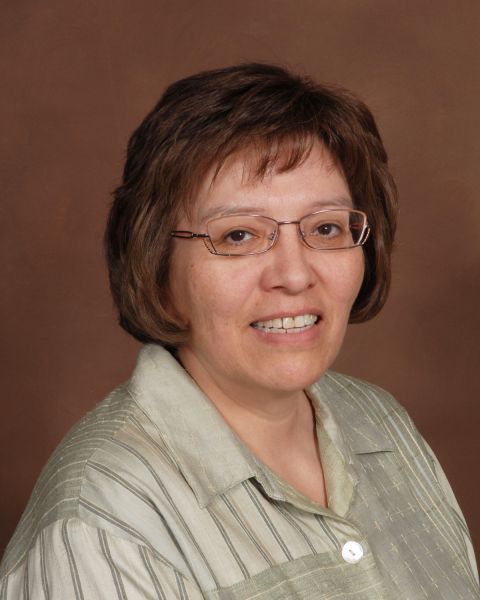
“The driving feature for many in my generation is to do something to help,” says Wendy Whitecloud, Law’84. Throughout her career, as a university law teacher, an academic support director, and a provincial commissioner, she has helped promote justice for Indigenous people. For her sustained and outstanding work, she received this year’s Justice Thomas Cromwell Distinguished Public Service Award.
Whitecloud’s path to law school was not a clear-cut decision at the beginning. She says she had been asked by school counsellors what she was going to do with her undergraduate degree in history other than teach. “I don’t want to teach,” she told them. Whitecloud laughs now thinking about that recollection after an almost 25-year career teaching Aboriginal law, property law, and constitutional law at the University of Manitoba.
Whitecloud, a member of Manitoba’s Sioux Valley Dakota First Nation, left her home as a teenager in order to attend high school where she was billeted with a family. After receiving her BA in history from the University of Calgary, she worked for the federal government directing Indigenous programs. Whitecloud tells the story of one day sitting in her office and looking out the window at the grassy hills near the Ottawa River. “Hallelujah, this is what I’m going to do for the rest of my life, so I better go back to school,” she said to herself. And so, she took an educational leave from her job and enrolled at Queen’s Law, along with her partner at the time.
“Queen’s was just starting an Indigenous course and I think that’s what held us there and kept us interested, because it was the first time students had a specific course with Indigenous material,” she says. But a career change wasn’t all that prompted Whitecloud to attend law school; it was also her desire to help people in a more impactful way. In her position with the federal government, she worked with Indigenous women’s groups and different Indigenous groups and saw firsthand the kind of work that they were doing. “For many people in my generation, that work was to address Indigenous issues like equality for women, educational and socio-economic opportunities for Indigenous people and their communities,” she recalls. “At the time there were no Indigenous formal rights in the Constitution either. There really wasn’t equity in terms of the Canadian society.”
After law school, she worked in various jobs across the country, including working for Government of Canada again and a position in academic support at the University of British Columbia. Eventually, she made her way back to her home province, providing academic support for Indigenous students at the University of Manitoba. From there, she began teaching a legal systems course in the law school, then gradually added courses in Indigenous law, property law, and constitutional law to her teaching repertoire. Despite her hesitancy towards teaching earlier in her life, she found teaching quite enjoyable, especially the reading and preparation for the courses she would teach. “Reading is my passion,” she says. Whitecloud maintained her commitment to helping people, spending almost six years helping Indigenous students at the University of Saskatchewan during the summer to prepare for law school.
Whether she was teaching a course in Indigenous law or not, Whitecloud always encouraged students to look critically at the law, especially in property and constitutional classes. “A lot of property rules are very unfair towards Indigenous people in terms of Aboriginal title and how title is managed here,” she says. In addition to teaching, she also sat on Manitoba’s Legal Aid Board, providing an Indigenous perspective, and spent nearly eight years chairing a board that oversaw a number of First Nations agencies providing services to the communities.
In 1999, Whitecloud served as a commissioner on Manitoba’s Aboriginal Justice Implementation Commission, which was created to develop an action plan for the findings of the Aboriginal Justice Inquiry commissioned by the province almost 10 years earlier. She says the Commission found that few changes had been made since the Inquiry and that the numbers of Indigenous people involved in the criminal justice system had only increased – an issue that persists today.
“The percentage of Indigenous people in the population is really small, yet they make up over 26 per cent of people in federal jails and are in much higher percentages for many provincial jails. The numbers just keep increasing,” she says. “As a society, we jail more Indigenous youth, as well.”
Her work also revealed issues with her province’s child welfare system. “Manitoba did modify its system afterward, but I don’t know if it’s any more effective than it was because we still have high numbers of Indigenous children in care,” she notes.
Despite the role that law has and continues to play in the disproportionate treatment of Indigenous people, Whitecloud says law is still an area in Canadian society where she felt recognized. “For me, law was one way that the system acknowledged that there was such a thing as Indigenous rights,” she says. She says that it makes her glad to see law schools carrying more of the weight of education about Indigenous people and the law, although she would like to see even more education. “I think that no matter what, Indigenous people have hope and that’s why they’ve been here for thousands of years. So, no matter what happens, some of us can at least hang on to that.”
Now easing into her formal retirement, Whitecloud reflects on the recognition from Queen’s: “It was really cool to be acknowledged in terms of the civil service, serving the community,” she says. While she doesn’t have any solid plans for her retirement yet, she continues to provide academic support to students at University of Manitoba through contract work and hopes to stay involved with community groups. For now, she’s also happy staying at home with family. “Life is fine,” she says. “It’s quite good actually.”
By Geena Mortfield